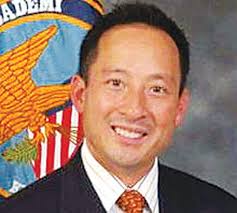Even with four machine guns stowed away for use by his nine-member department, Medina Police Chief Jeffrey Chen never quite had the firepower to save his own job. His duty in Bill Gatesland was to protect the rich, coddle the famous, and chase the geese out of millionaires’ swimming pools.
“Due to the caliber of the residents in our community,” Chen told us in 2011, explaining why he kept fully automatic weapons on hand for the city of 3,000, “we are a high-risk target.”
So was Chen, it turned out – he was fired for misconduct, although in his view, it was for being Charlie Chan in the eyes of a throwback society, where residents and co-workers asked if “you people” eat turkey at Thanksgiving and wondered aloud about the reputedly undersized Asian penis.
He went to court and in March this year, a federal jury awarded him $2 million as a victim of racial discrimination.
Case closed. Then last week, reopened – with an extraordinary reversal: The judge who presided over the trial agreed there was prejudice involved. But it was shown by the jury, he decided.
He tossed the verdict, calling Chen’s civil rights victory a miscarriage of justice.
Yes, there was evidence of ignorance and race-baiting along the Gold Coast of Lake Washington, U.S. District Court Judge Thomas Zilly agreed. But much of it was dubious and some of it the jury shouldn’t have heard. Yet Marianne Jones, Chen’s attorney, finessed it into the record.
“The discriminatory remarks Jones paraded before the jury during her opening statement and about which she elicited testimony from plaintiff and his experts during trial,” said Zilly in his findings issued Friday, “were excluded precisely because defendants in this matter, City of Medina and [city manager] Donna Hanson, cannot be held liable on the basis of such comments.
“By continually intimating to the jury that racial animus on the part of defendants was demonstrated by the offensive conduct of individuals who were either disciplined for the behavior or disconnected from defendants by the passage of time or a lack of privity, Jones converted an extraordinarily weak case of discrimination into a $2 million verdict, the bulk of which is unsupported by the evidence. Defendants are therefore entitled to a new trial.”
Hanson told us in 2011 that Chen at first resigned, then unresigned, in a dispute with her; she ultimately fired him for, among other issues, making false statements, forging city memos under the names of others, and misusing city funds. Chen denied those claims and told us he was “a professional and have always conducted myself as such.” He had wide support as well, as evidenced by several community meetings. His civil rights lawsuit, however, required him to demonstrate the incivility of his opponents.
Judge Zilly says attorney Jones’ “irregularities” began on the first day. Though the judge had earlier ruled that racial comments loosely attributed to former Medina employees and others had to be excluded because they were dubious or not directly relevant to the city’s firing, Jones in her opening argument referred to a “Charlie Chan” remark three times, a “smiling Chinaman” comment twice, and touched on additional alleged remarks by others including Asians have “small ones,” before the court interceded.
Jones told the judge his rulings had been unclear to her. But, Zilly said in his 44-page Friday order, “No reasonable attorney could fail to understand that the comments…were not to be repeated to the jury.” As well, he said, “In the Court’s view, plaintiff relied primarily on innuendo and subterfuge rather than on evidence” to influence the jury.
Zilly realizes the gravity of his reversal – it was the first time in his 25 years on the bench that he’d even ordered a new trial, he said. He does not explain why a mistrial was not called early on, nor indicate whether he felt the jury could disregard what it had heard. But he does say “The undersigned judge was completely surprised by the jury verdict in this case, and can only conclude that it was the product of passion and/or prejudice.”
Medina, he said, “would have terminated plaintiff on the basis of the wrongdoing alleged in the notice of discharge even if race and/or national origin had played no role in the decision.”
Chen hasn’t yet notified the court whether he will seek to retry his case. But Zilly left a warning for his attorney if she should return: “In granting a new trial, the Court does not prejudge whether another jury will reach a similar or different verdict,” he wrote. “However, Court will more rigorously patrol plaintiff’s counsel’s conduct to prevent her from infusing into a second trial the various contaminates that make upholding the first verdict impossible.”








